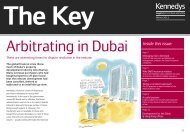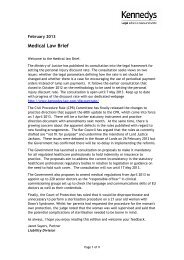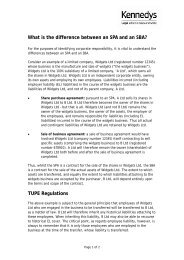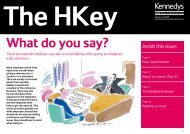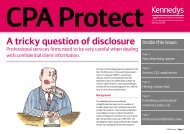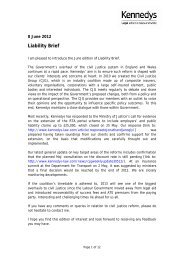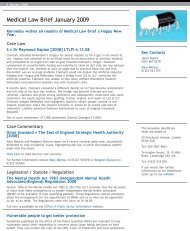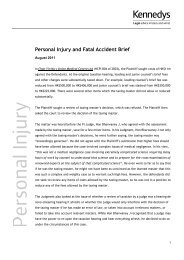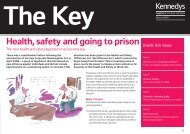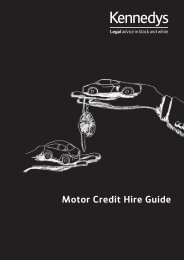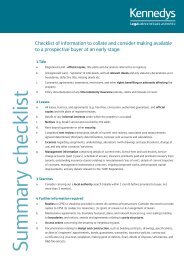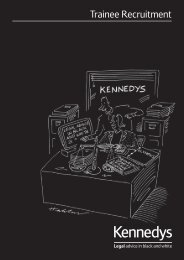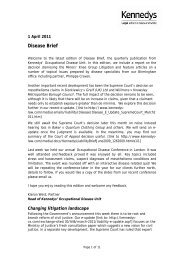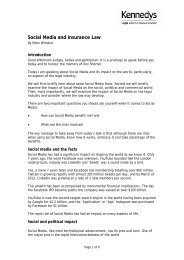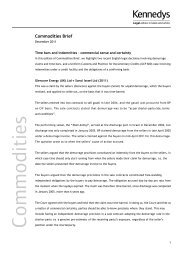Download Liability Brief - Kennedys
Download Liability Brief - Kennedys
Download Liability Brief - Kennedys
Create successful ePaper yourself
Turn your PDF publications into a flip-book with our unique Google optimized e-Paper software.
In both cases, the Claimants were involved in road traffic accidents. Quantum was<br />
agreed, with the Claimants accepting Part 36 offers made by the Defendants, prior<br />
to proceedings being issued, of less than £10,000. Costs could not be agreed and<br />
both Claimants issued Part 8 proceedings for costs under the procedure set out in<br />
CPR 44.12A.<br />
Although generally costs would be assessed in this type of case on the predictive<br />
basis, there is a conflict in the CPR between CPR 36.10 and CPR 45 Section II.<br />
In both cases, the Claimants sought to argue that the Part 36 provisions meant that<br />
they had an automatic entitlement to standard basis costs which superseded the<br />
provisions of Part 45. They argued that Part 36 was essentially a deemed order for<br />
costs in its own right and that an alternative order should not, therefore, be made.<br />
In Solomon, His Honour Judge Platts overturned the initial decision of District<br />
Judge Wheeler that standard basis costs should apply. He decided that the<br />
provisions of Part 36 only applied where proceedings had been issued. Since they<br />
had not been issued, there was no deemed order for costs and the Court was bound<br />
by the provisions of 44.12A(4A).<br />
In Oliver, District Judge Smith also found that predictive costs should apply. He<br />
reached his conclusion on the basis that the effect of Part 45 is to establish the<br />
reasonable and proportionate costs of the items to which it relates for the purpose<br />
of the assessment of recoverable costs in cases of the kind to which it refers.<br />
Held: The Court of Appeal dismissed the Claimants’ appeals, holding that<br />
predictive costs should apply in both cases. Lord Justice Moore-Bick referred to the<br />
established principle that, when an instrument contains both specific and general<br />
provisions and some of those are in conflict, the general are intended to give way<br />
to the specific. He considered that, as the provisions in Part 36.10 are general and<br />
the provisions of Section II of Part 45 are specific, the provisions in Part 45 should<br />
govern the cases to which it applies.<br />
Comment: Since the introduction of predictive costs, claimants have sought ways<br />
of escaping their restrictions and limitations, for example by prematurely issuing<br />
claims or instructing counsel to attend infant approval hearings, or by any number<br />
of other increasingly inventive means.<br />
It is therefore both refreshing and reassuring to see the Court of Appeal reigning in<br />
such attempts and maintaining the spirit of the scheme as it was intended.<br />
Both these cases dealt only with proceedings issued under CPR 44.12A. However, it<br />
is always open to a claimant to issue proceedings for outstanding costs under CPR<br />
Part 7 or Part 8 instead. Lord Justice Moore-Bick, whilst accepting he was not<br />
considering this issue, did however consider that it was “very doubtful” such an<br />
attempt to avoid predictive costs would be successful.<br />
For further information please contact Elizabeth Love on +44 114 253 2048 or email<br />
e.love@kennedys-law.com.<br />
Page 2 of 10



